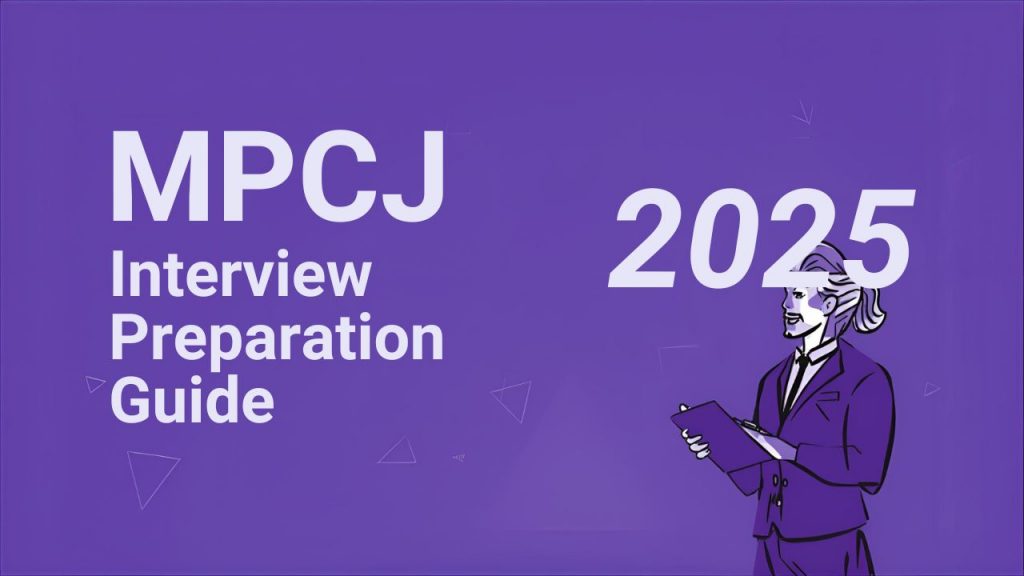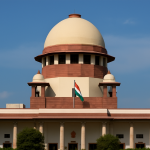A practical roadmap to help you to face the Madhya Pradesh Civil Judge interview with clarity, confidence, and character.
After months of hard work through prelims and mains, this final round decides how ready you are to wear the robe of a judge. If you’ve till reached here, congratulations. Now it’s time to prepare smartly, calmly, and confidently for the MPCJ interview 2025.
f you’ve cleared the Madhya Pradesh Civil Judge (MPCJ) Mains Examination, take a moment to breathe — you’ve crossed the toughest academic hurdle. However, now comes the stage that truly defines your entry into the judiciary — the MPCJ Interview, often called the Viva Voce
Unlike the mains exam, this round is not just about laws or case citations. It’s about you — your mindset, reasoning, and your ability to think like a judge.
The interview board, often including senior judges and experienced members of the selection commission, is not trying to find a scholar, they’re searching for a balanced, fair, and mature legal mind.
In this detailed guide, you’ll learn how to prepare for the MPCJ interview, how to present yourself, what topics to revise, and the real strategies that toppers and retired judges recommend.
Understanding the MPCJ Interview Round
The Madhya Pradesh Civil Judge interview (commonly called the viva voce) usually carries 50 marks and is conducted by a panel of judges and senior legal experts.
A minimum of 20 marks out of 50 is required to qualify for this round — this is an important point to keep in mind while preparing.
The panel doesn’t expect you to know every section by heart — they want to see how you think, reason, and respond under pressure.
Here’s what the MPCJ interview panel typically evaluates:
Clarity of thought and expression
Judicial temperament and ethics
Confidence and body language
Knowledge of current legal issues
Balanced and unbiased perspective
They want to know how smartly you behave under the situation
Judicial temperament: Are you calm under pressure?
Clarity of thought: Can you analyse logically instead of memorizing?
Moral and ethical understanding: Would you uphold justice above personal bias?
Awareness: Do you follow current legal developments and judgments?
Personality: Are you humble, confident, and respectful in communication?
The board wants to see whether you carry the dignity of the post
Tip: Treat the MPCJ interview like a conversation, not a cross-examination. The more natural and confident you sound, the more impact you create on the panel
Step-by-Step MPCJ Interview Preparation Strategy
Stay Updated with Legal Current Affairs
This is where most candidates lose marks. You must stay updated with legal current affairs for judiciary, especially recent Supreme Court judgments, constitutional amendments, and legal reforms.
- Read national newspaper daily (preferably The Hindu or Indian Express).
- Follow legal news portals and blogs.
- Revise landmark judgments like Kesavananda Bharati v. State of Kerala and Navtej Singh Johar v. Union of India.
You can even note down one legal current affair daily in a small notebook that will help you to Builds recall for the interview.
Revise Core Legal Subjects — But With Logic ,Not with Fear
Every candidate knows the law, but few can explain it simply. That’s where you can stand out.
Focus on conceptual clarity for these MPCJ interview law subjects:
- Constitution of India
- Indian Penal Code (IPC)
- Criminal Procedure Code (CrPC)
- Civil Procedure Code (CPC)
- Indian Evidence Act
- Transfer of Property Act (TPA)
- Indian Contract Act
- Limitation Act
Rather than memorizing sections, understand why the law says what it says.
For example, if asked —
“What’s the difference between culpable homicide and murder?” —
Don’t quote sections. Explain the intention, knowledge, and gravity behind both offences.
Remember: Interviewers appreciate reasoning more than recitation.
Stay Updated on Legal Current Affairs and Case Laws
Your MPCJ interview preparation must include awareness of recent judgments and legal news.
Here’s how to prepare smartly:
1. Read Bar & Bench, Live Law, and The Hindu legal section daily.
2. Make short notes of landmark Supreme Court judgments (past 6 months).
3. Keep an eye on MP High Court judgments, especially related to environment, women’s rights, and administrative law.
Prepare for Personal & Situational based Questions
Apart from legal knowledge, expect personal and opinion-based questions such as:
“Why do you want to be a judge?”
“What is your view on bail versus jail?”
“If two witnesses give contradictory statements, how would you evaluate them?
Your goal here is to remain calm, neutral, and ethical. The panel wants to assess your judicial temperament — not your debating skills.
Practice Through Mock Interviews and Expert Feedback
Mock interviews are not optional — they’re essential for any serious aspirant.
Participate in MPCJ mock interviews conducted by experts or retired judges.
They simulate the real board environment, helping you manage anxiety and improve your delivery.
Benefits of mock sessions:
Identify weak areas and filler habits
Learn to structure answers
Receive unbiased feedback
Build natural courtroom-like composure
If you’re preparing under guidance, make sure your mentor gives individual feedback — not just general tips.
Focus on Madhya Pradesh–Specific Questions
The MP Civil Judge interview often includes questions about state-specific laws, governance, and judiciary structure.
Prepare short notes on:
Administrative setup of MP judiciary
District court hierarchy
Recent MP High Court judgments
E-courts initiative in Madhya Pradesh
Local legal reforms
Example questions:
“Describe the structure of MP High Court and its benches.”
“What’s your view on the role of judiciary in rural justice delivery?”
Know your home district too — its major cases, social issues, and geography.
Focus on Personality & Body Language
You don’t have to sound like a lawyer; you have to appear like a future judge — poised, respectful, and rational.
Dress formally (light – coloured shirt, dark trousers/saree).
Maintain eye contact but don’t stare.
Greet politely, sit straight, and avoid nervous hand movements.
Smile naturally when appropriate — confidence is silent but visible
Build a Calm and Positive Mindset
Interviews test your mental stability as much as your intellect.
Sometimes, the board intentionally asks a confusing question to see your reaction.
If you don’t know something, say politely —
“I’m not sure, sir/ma’am, but I will definitely read about it.”
That one line shows honesty, humility, and learning attitude — all signs of a future judge.
Other mindset tips:
Avoid overconfidence.
Maintain steady eye contact.
Never criticize government, judiciary, or previous judgments.
Speak with calm conviction.
The Night Before the Interview — Preparation Checklist
- Revise your DAF (Detailed Application Form).
- Keep original documents and photocopies organized.
- Revisit your short legal notes and 10 case laws.
- Sleep early — don’t study till midnight.
- Visualize yourself answering with calm confidence.
On the day of the interview:
Reach the venue early.
Be courteous to everyone.
Stay relaxed — treat it as your conversation with seniors, not superiors.
Common Mistakes to Avoid in MPCJ Interview
some of the common mistakes you can avoid while preparing for interview
Over-explaining every answer
Arguing or defending your opinion aggressively
Forgetting recent court judgments
Poor posture or lack of eye contact
Ignoring current social or legal issues
Avoid these and focus on showing your best version — balanced, composed, and thoughtful
Conclusion: The Final Word — Confidence Rooted in Clarity
The MPCJ interview is not a test of knowledge — it’s a test of judgment.
The panel looks for someone who can balance law with empathy, logic with fairness, and power with humility.
You’ve already cleared the toughest stages; now it’s about being the best version of yourself.
Let your calmness, clarity, and confidence speak louder than your resume.
Because when you enter that room, you’re not just a candidate —
you’re the future voice of justice in Madhya Pradesh.



